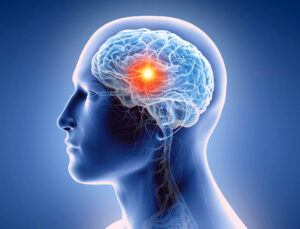Brain cancer, scientifically termed intracranial neoplasms, is a multifaceted and frequently perilous medical ailment that emerges within the brain. This article endeavors to illuminate the fundamental facets of brain cancer, encompassing its origins, manifestations, diagnostic procedures, and the array of treatment alternatives accessible.
Understanding brain cancer is crucial for early detection and effective management, saving lives and improving outcomes.
What Is Brain Cancer
Brain cancer is characterized by the abnormal growth of cells within the brain, uniquely confined to the brain itself and potentially disrupting normal brain functions.
Causes of Brain Cancer
“Exploring the intricate web of factors behind brain cancer‘s enigmatic origins, researchers have illuminated genetic influences, radiation exposure, environmental elements, aging, and familial predisposition as key players.”

Symptoms of Brain Cancer
The kaleidoscope of symptoms in brain cancer mirrors the tumor’s location and size, with common signs encompassing.
Headaches: Frequent and severe headaches that worsen over time are a common early sign.
Nausea and Vomiting: Persistent nausea and vomiting, particularly in the morning, can be indicative of brain cancer.
Changes in Vision: Blurred vision, double vision, or loss of vision in one eye may occur.
Cognitive Changes: Memory problems, confusion, and difficulty concentrating can be early indicators.
The sudden onset of seizures and unexplained sensations of weakness or numbness may signal the presence of brain cancer, prompting a comprehensive assessment encompassing medical history, physical exams, and advanced imaging like CT scans, MRI scans, or PET scans; occasionally requiring biopsies for confirmation and tailored treatment plans. Individualized treatment plans for brain cancer are tailored to the specific cancer type and its stage, offering the best chance for successful outcomes.
They may include
Surgery: Surgical removal of the tumor is often the first step in treatment if feasible.
Radiation Therapy: High-energy radiation is used to target and destroy cancer cells.
Chemotherapy: Medications are administered to kill cancer cells or stop their growth.
Precision medicine in cancer treatment involves tailoring therapies to individual patients based on their genetic profiles, aiming to enhance effectiveness and minimize side effects.
Conclusion
Brain cancer poses a multifaceted and formidable obstacle, but progress in medical research and technology has opened avenues for improved approaches to diagnosis and treatment. Timely identification and swift intervention remain pivotal for optimizing outcomes. If you or someone you care about encounters any worrisome symptoms, it is imperative to promptly seek medical assistance to address this critical health concern.
Read More:- Calendula Flower: A Flowing Plant Aiding In Restoring Skin Health!
Read More:-Exploring the Multifaceted World of Tea: Unearthing Its Unexpected Effects
